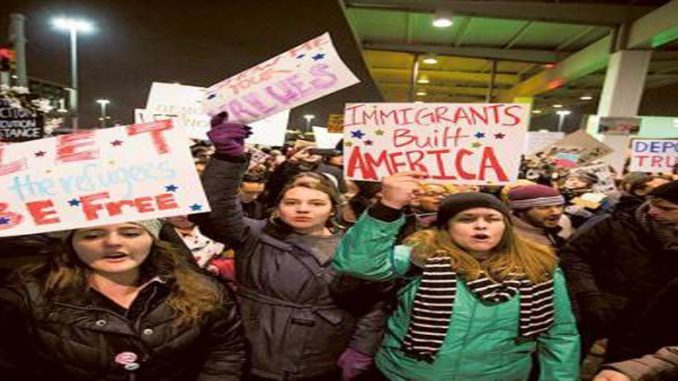
 US President Donald Trump’s US travel entry ban against seven Muslim-majority countries stranded transit passengers at Dubai International Airport on Sunday. However, Emiratis has been exempted from Trump’s ban.
US President Donald Trump’s US travel entry ban against seven Muslim-majority countries stranded transit passengers at Dubai International Airport on Sunday. However, Emiratis has been exempted from Trump’s ban.
In a series of tweets, Yousef Al Otaiba, Ambassador of the UAE to the US, announced that the embassy has consulted with American officials, and has been assured that the new immigration law will not affect UAE citizens.
Al Otaiba further confirmed that Emiratis can proceed with their plans to visit the United States.
The assurance was made following President Donald Trump’s US travel entry ban earlier this week against seven Muslim-majority countries, which left transit passengers stranded at Dubai International Airport.
Meanwhile, airlines in the UAE said they were doing everything they can to help passengers caught in the 90-day temporary US entry ban, which include the countries of Iraq, Syria, Iran, Libya, Somalia, Sudan and Yemen.
On Monday, Emirates said it has adjusted its crews for flights to the United States, while an Etihad Airways spokesperson told Gulf News that is working closely with the US Customs and Border Protection agency in Abu Dhabi and in the USA on the immigration issues presented over the weekend.
Etihad Airways said: “Our joint interest is on ensuring that compliance and the well-being of all passengers is maintained across our global network.”
US blacklist strands Dubai transit flyers
Despite legal court rulings by US judges allowing green card holders to return to the US from banned countries, passengers flying through Dubai en route to US said they were stopped by Transportation Security Administration (TSA), an arm of US Homeland Security.
A Dubai Airports spokesman did not elaborate on the extent of the travel stoppages by officials in Dubai on Sunday but did say the airport was complying with the new rules.
“US Customs and Border Protection has issued an Immigration Advisory Notice relaying new US immigration entry requirements, which include restrictions on nationals from Sudan, Libya, Somalia, Syria, Iran, Iraq, Yemen travelling to the US,” the spokesman said. “Dubai Airports is monitoring the situation.”
In one reported case, Nazanin, a woman visiting her mother in Tehran, wrote on Facebook that she was removed from an Emirates plane in Dubai bound for Washington even though she has a green card allowing her to work and live in the United States.
“Only a few hours after the order was signed, I got to the airport, got on a plane and made it to Dubai. After waiting in the line to get my documents checked and after 40 minutes of questions and answers, I boarded the plane to Washington, only to have two TSA officers getting in and ask me to disembark the plane!!! Yes after almost seven years of living in the United States, I got deported,” the woman wrote. “No one warned me when I was leaving, no one cared what will happen to my dog or my job or my life there. No one told me what I should do with my car that is still parked at the airport parking. Or what to do with my house and all my belongings. They didn’t say it with words but with their actions, that my life doesn’t matter. Everything I worked for all these years doesn’t matter,” she said.
Another passenger wrote on his Twitter account that people were stranded in the airport including a couple who left two daughters, seven and nine, at home in America, “with their neighbour for a quick trip to attend a funeral. Green card holders for 11 years … Another man went to meet his future in-laws in Turkey and now can’t get back. [A] PhD student.”
An Emirates airline spokesperson said that it was working to meet American regulations and experienced no major disruptions.
“With regards to entry requirements for travel to/from the USA, Emirates continues to comply with the guidance provided to us by the US Customs and Border Protection,” the spokesperson said.
“A very small number of our passengers travelling were affected by the new US immigration entry requirements implemented by the US Customs and Border Protection on 28 January 2017. Where applicable, we are assisting the affected travellers with their flight re-bookings. Emirates is offering rebooking and refund options to passengers holding passports from the seven affected nations, who are booked to travel to/from the USA. Passengers are responsible for ensuring they have the required documents for their travel. Please see our website for more information.”
Emirates said it is “offering rebooking and refund options for affected passengers who are booked to fly to/from the USA between 28 January and 28 February”.
A British Airways spokesperson said on Sunday that it was also complying with the US-imposed travel restrictions.
“We always meet our obligations under international immigration agreements,” said the spokesperson. “We are offering affected customers a refund for their travel to the US, or the opportunity to rebook their flight.”
An Iraqi resident in the UAE said that he booked a flight to the US for next week to visit his family in Texas and he doesn’t know what to do now. “My father and mother [are] staying in Houston, and I usually go to visit them. I get the visa before a month and booked a flight on Emirates to US. I was told to cancel my flight for unknown time. I don’t know what to do now, It’s just another problem for Iraqis now.”
Another Iraqi man in Erbil, north of Iraq, granted a refugee visa to the US and booked on a flight on Monday, was told to wait by American consulate, “I prepared my bags and sold everything to start a new life in US, after [I] applied as refugee due to security threats in Iraq. I was told to cancel my flight and wait for [an] unknown [period of] time. Trump[’s] decision was a shock for me as I can’t return to Baghdad, my hometown, and can’t afford to stay in Erbil. I sold everything and was planning to join my brother in US,” Ahmad Ebrahim, a 34 year old, said.



